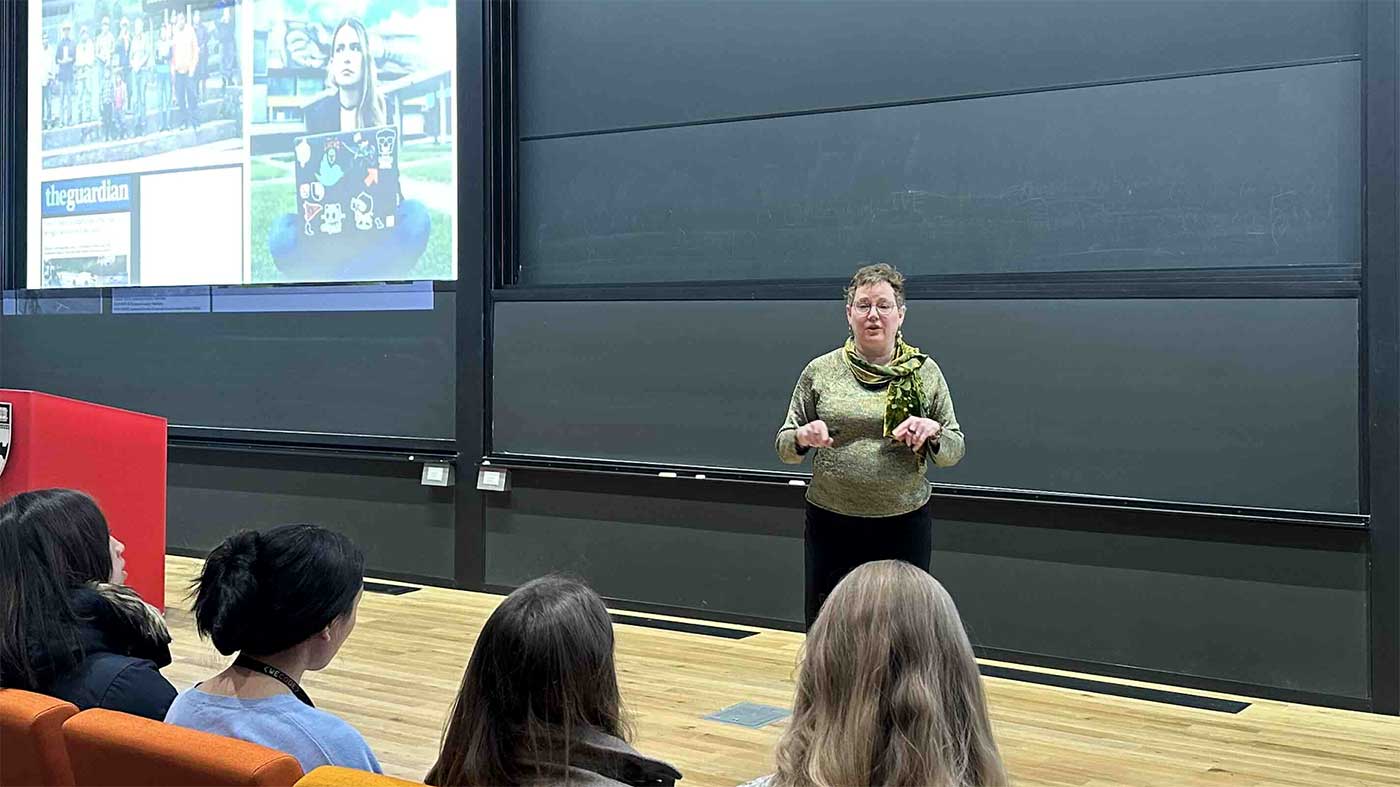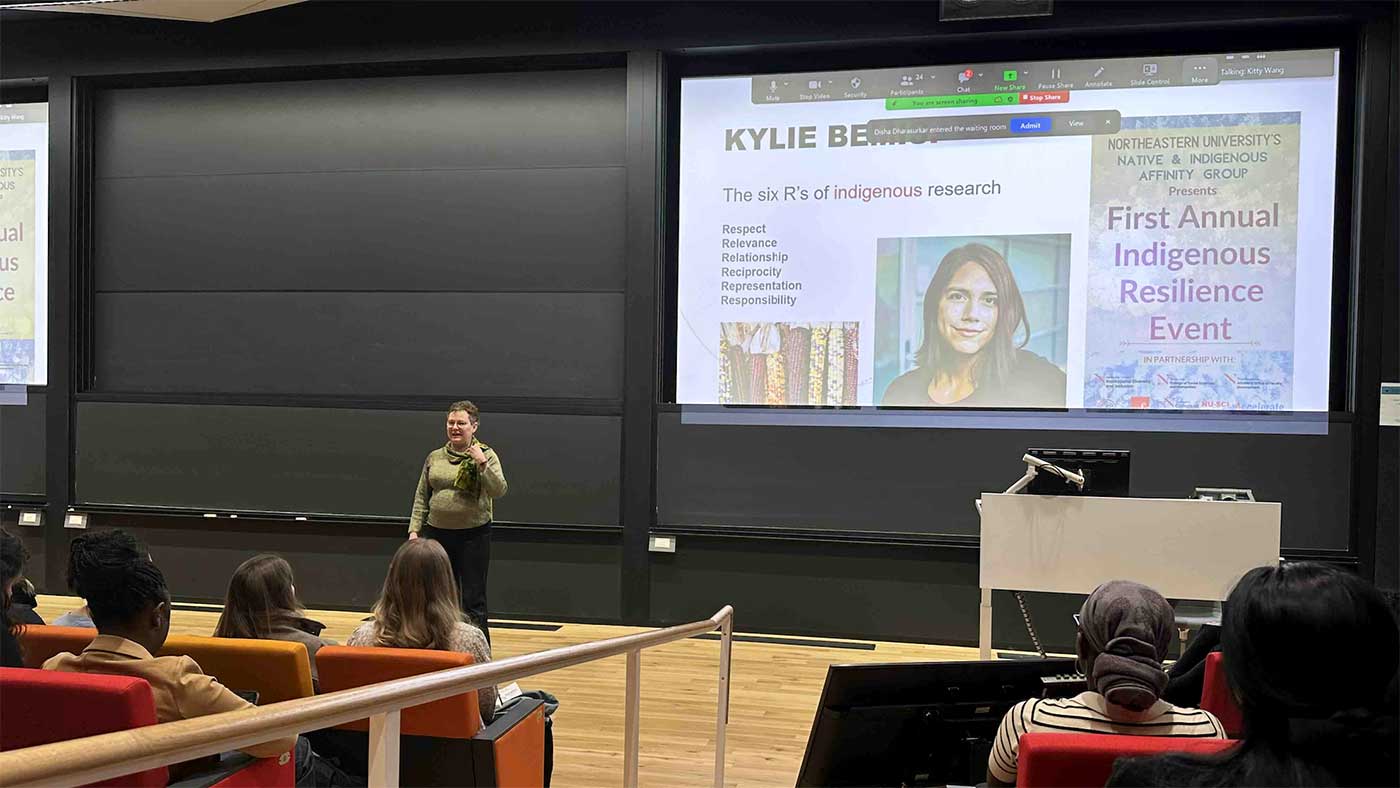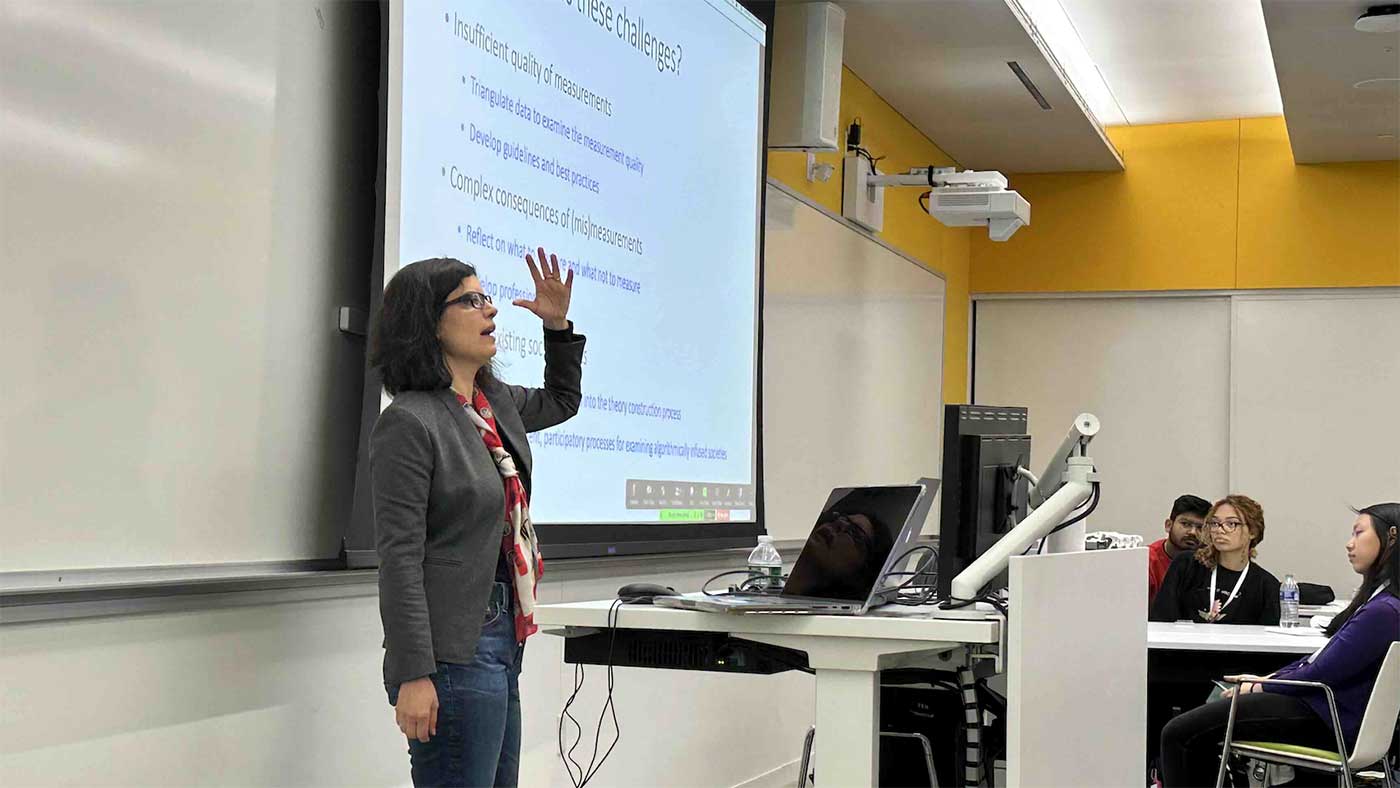Courage, responsibility are the menu of the day at student-run women in tech conference
Author: Matty Wasserman
Date: 03.05.24
 Photos by Matty Wasserman.
Photos by Matty Wasserman.
In a keynote address to hundreds of young female computer scientists, Khoury College Dean Beth Mynatt summarized her decades-long computer science journey with one word: courage.
The audience had gathered for WeCode, the world’s largest student-run women in tech conference. Organized annually by Harvard University students, the conference drew more than 1,000 students from 300 different colleges, hosted over 50 guest speakers, and featured 30 workshops at Harvard’s Science and Engineering Complex on February 17 and 18.
In addition to Mynatt’s hour-long keynote, Khoury professor Tina Eliassi-Rad hosted a workshop on machine learning, and Mynatt also took part in a panel which explored the intersection of technology and social good. Afterwards, both spent time chatting with students in small groups at Khoury College’s open meet-and-greet lunch.
In her address, Mynatt spoke of courage as her “North Star” — the term she’s come to embrace as she’s navigated the complex, ever-changing computer science field.
“It’s funny, because I never would have described myself as a courageous human being. Maybe a little bit opinionated, maybe energetic and passionate,” Mynatt said. “But somehow, those characteristics have distilled in me that courage — and it’s a very directed form of courage — of what we can accomplish as the future of computer science.”
Mynatt spoke at length about her own journey in the field, one that showed her that technology is only as important as the people who build and use it.
“When I look back on my career, those 30-plus years, my world has always centered on the relationship between people and technology,” Mynatt said. “Because when you think about that relationship, technology doesn’t evolve on its own; it’s how people adopt technologies, how they reject them, put them onto new users. It’s like it’s a dance between the two.”

Mynatt also stressed that technology’s seismic impact — the same impact that makes the field so exciting — also means that those who practice it bear great responsibility. The next generation of computer scientists have endless opportunities to push barriers and shape the field’s future, but it takes courage to find those opportunities and to use that power to make a positive impact.
“When you’re creating new technologies, it’s not just the technical capabilities that you need to understand,” Mynatt said. “You need to understand the whole framing — the who and the why, who’s going to pay, who’s going to be impacted, who is going to be uplifted, and who is going to be hurt … technology amplifies the very best and, as we’ve discovered, the very worst of human behavior.”
Mynatt’s message of courage resonated with many of the attendees, including Niyati Khandelwal, a master’s student on Northeastern’s Seattle campus and an ambassador for Rewriting the Code (RTC), an organization which supports young women in the tech industry and which made Khoury College its first collegiate partner last year. To Khandelwal, courage means both the ability to use technology as a positive force and to have confidence in her own abilities — particularly as a woman in a field traditionally dominated by men.
READ: Northeastern’s Rewriting the Code ambassadors share their stories
“Especially as women, I think there’s an unconscious mindset where we are fearful or we are always second guessing our decisions,” Khandelwal said. “But like Dean Beth said, if you take courage as your North Star, I think that will help you move ahead and blaze a path without being intimidated by whatever else is around you. Courage is about knowing that it’s okay if something goes wrong or there’s a struggle, because you are trying and you are going to get there eventually.”
That sentiment was reinforced by RTC founder Sue Harnett, who introduced Mynatt at the conference. Harnett spoke of the value of WeCode being student-run and welcoming to aspiring computer scientists of all backgrounds, and she encouraged students to take full advantage of both the conference’s resources and the community of women it attracted.
“This is the way a conference for women in tech should be,” Harnett said. “You have the opportunity to hear from cutting-edge tech companies, from unbelievable people in their field on the academic side, and from young engineers from all different kinds of tech companies who are here to support you … you have an opportunity to interact with a lot of women who are just ahead of you, and you can feel more comfortable asking them questions about what it’s like to be a woman in tech.”
Later in the morning, Eliassi-Rad held a smaller workshop with roughly 50 students where she discussed the biases of machine learning systems, the complex processes that generate the systems’ training data, and the forces behind misleading information and false claims. In so doing, Eliassi-Rad touched on many of the same themes as Mynatt, chiefly the responsibility of those who design algorithms and complex systems.
“The one thing that I want you to take from this is that no matter where you come from, [machine learning] will affect you. So please get rid of this veil of ignorance of ‘us’ versus ‘them,’” Eliassi-Rad said. “You are part of this society you’ve built. And now your own algorithms will be used on you. Good luck, because you know all the problems right? So you need to work on how the problems will be solved.”

In addition, Eliassi-Rad dove into another potential problem caused by the commercialization of machine learning — ambitiously overstating how broad of a population an algorithm works on, often with an eye toward receiving investor funds or a quicker rollout. To ensure machine learning is integrated fairly and ethically for consumers, Elassi-Rad said, both the developers and marketers must ensure their sales pitch aligns with the technology’s capabilities.
“Unfortunately, everything in America now has become marketing and advertising. So when companies put out a new grammar assistant, they say, ‘It will work on anybody, anywhere,’ which is completely wrong,” Eliassi-Rad said. “At least be honest. Say, ‘Look, ‘my algorithm works on white males between 35 and 60 who live in the Northeast.’ But often, people do not say that because they want to make more money.”
While the workshops throughout the weekend were insightful for any aspiring computer scientist, to Khandelwal, the visual of hundreds of other female attendees with similar goals and experiences as her was most reassuring.
“In a classroom, or in my previous internships, I used to look around me and I’d see mostly men,” Khandelwal said. “But coming to a place like this, you feel much safer. You feel much more confident about yourself, you feel that you can open up and you can be vulnerable and you can talk about things… you know that the people around you are facing the same difficulties and challenges that you are facing.”